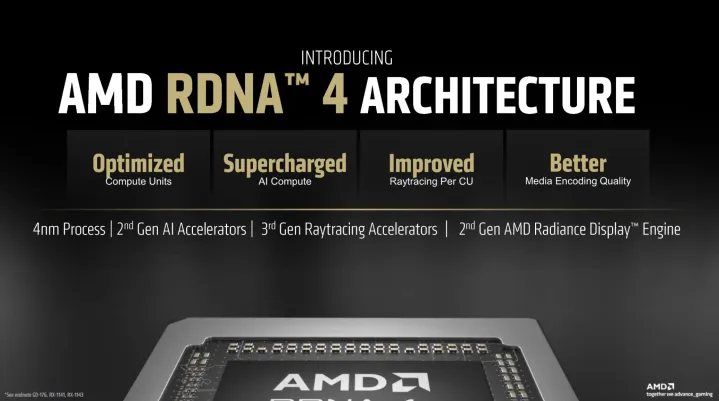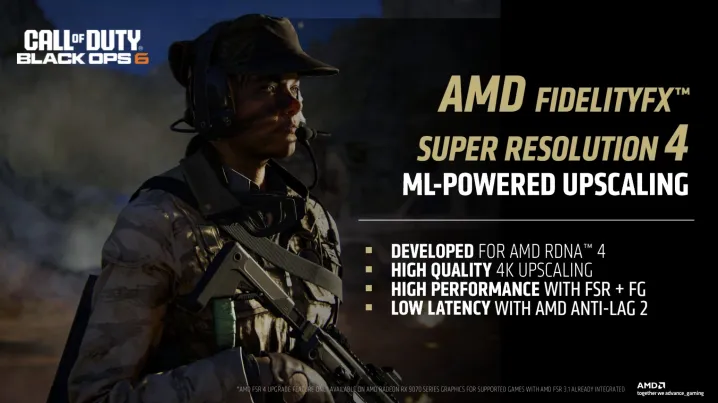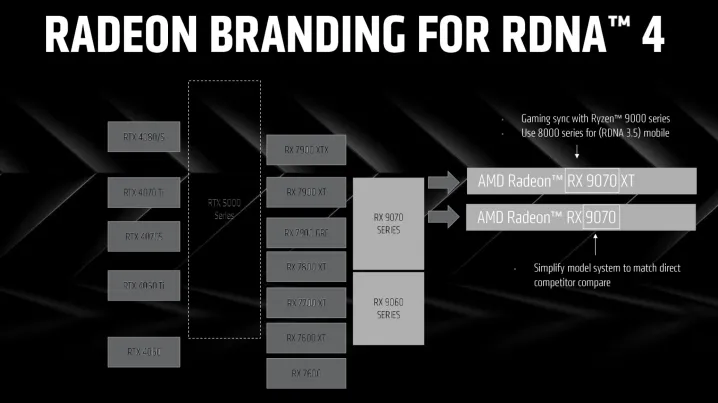AMD revealed its long-awaited RDNA 4 architecture at CES 2025, but it arrived with more of a thud and less of a bang. Although the new RX 9070 XT and RX 9070 could make the list of the best graphics cards, it’s hard to say if they will right now, despite the fact that the cards are expected to arrive in the first few months of this year.
In its action-packed CES keynote, the new RDNA 4 range was a passing note instead of the main event. Although details about the new RDNA 4 architecture are light, AMD says it updated just about every aspect of its GPU design. That includes better ray tracing performance with third-gen RT accelerators, broader media encoding support with a second-gen AMD Radiance Display engine, and critically, AI grunt with second-gen AI accelerators.
 AMD
AMDThose AI accelerators are important, as it appears they’ll power AMD’s next-gen FSR 4 upscaling and frame generation tech. AMD has been fighting against Nvidia’s DLSS for years now, but FSR 4 looks like a turning point. The company says the ML-powered feature was “developed for RDNA 4,” which means the feature is exclusive to RDNA 4 graphics cards. It’s worth noting that AMD’s last-gen GPUs, like the RX 7900 XTX and RX 7900 XT, come with first-gen AI accelerators as well.
Still, only RDNA 4 GPUs will be able to use the new feature, and AMD says it’ll be available in games that already support FSR 3.1.
 AMD
AMDFor RDNA 4, AMD announced that the RX 9070 XT and RX 9070 will arrive in the first quarter of 2025, but it didn’t provide a release date. The company also revealed that it’s working on a range of RX 9060 GPUs, though it didn’t detail any specifics about that range. As rumors have suggested for over a year, and as AMD has hinted at itself, the RX 9070 XT and RX 9070 won’t compete with Nvidia at a flagship level. AMD is targeting midrange gamers with its new GPUs.
Get your weekly teardown of the tech behind PC gaming
Thankfully, AMD detailed where it expects RDNA 4 GPUs to fall in relation to the rest of the market. You can see how AMD breaks down the comparison below. AMD didn’t share any hard performance numbers, but it looks like the RX 9070 XT will perform about as fast as an RTX 4070 Ti or RX 7900 XT, while the RX 9070 will compete with the RTX 4070 Super and RX 7900 GRE.
 AMD
AMDHow well AMD’s GPUs will compete is an open question, however, and one that reviewers will have to answer once the cards are available. Despite scaling down its graphics card lineup, AMD is still coming out in full force with partner designs from Acer, Asus, Sapphire, XFX, ASRock, Gigabyte, PowerColor, and more. AMD hasn’t revealed a Made By AMD design for the RX 9070 XT and RX 9070, suggesting that we’ll only see board partner designs.
The question on the tip of everyone’s tongue is how much these new GPUs will cost, which is a detail AMD didn’t disclose during its keynote. Not only does AMD have last-gen GPUs to contend with, it also has Nvidia’s RTX 50-series GPUs to go up against, and we expect those to be announced later today during Nvidia’s CES keynote.



















 English (US) ·
English (US) ·